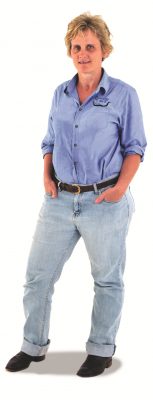A long-serving cattle veterinarian has outlined six reasons why she believes Queensland should not change legislation to permit non-veterinarians to pregnancy test cattle, as is allowed by the Northern Territory and Western Australia.
Queensland cattle producer representative body AgForce has been campaigning for several years for the Queensland Government to amend the State’s Veterinary Services Act 1936 to allow pregnancy testing by accredited non-veterinarians.
AgForce argues pregnancy testing is an essential component of herd management to maintain high fertility rates, but relying on veterinarians to do the work within required time frames can be difficult and expensive. It says the current vet-only restruction places Queensland producers at a competitive disadvantage to producers in other states and territories.
The Queensland Government is asking all stakeholders to have a say on the issue by November 30, before it makes a decision.
Dr Sandi Jephcott, based at Surat in Southern Queensland, has had extensive experience as a veterinarian and educator in the beef cattle industry, both in Australia and overseas.
In a written submission she has outlined six reasons why she believes the status quo should remain around pregnancy testing regulations in Queensland:
Employment: “In the last 10 or so years Australian veterinary schools have increased from four (Brisbane, Sydney, Melbourne and Perth) to seven (Brisbane, Townville, Sydney, Wagga Wagga, Melbourne, Roseworthy and Perth).
“Class sizes have also increased so this has more than doubled the number of graduating veterinarians with a HECS debt that need to find work”.
Biosecurity: “Also over the last 10 years, DAF resources in rural Queensland have significantly diminished, including employment of veterinarians, so it is vital that private veterinarians continue to visit cattle properties to observe the heath of livestock.
“Producers are not going to request veterinarians to visit a property for biosecurity reasons so jobs such as pregnancy testing and bull testing will encourage producers to get veterinarians to come onto the property.
“Maintaining biosecurity is vital for our predominantly export market for our beef.”
Skills: “Veterinarians have a range of skills so they are not just testing for empty or pregnant, they can pick up on any reproductive disease issues, abnormalities, abnormal conception patterns, general health of the livestock etc.
“They can discuss with the producer disease prevention measures, nutrition, management issues etc.”
Maintaining services in rural communities: “For some rural veterinarians, pregnancy testing determines whether they maintain a clinic in a rural town. If the vet leaves town, citizens with dogs, cats, horses and other animals will have a long way to travel.”
Preg testing their own cattle: For producers living remotely without easy access to veterinarians, the law only says they cannot pregnancy test for fee or reward, therefore they can test their own cattle.
Animal welfare: “Veterinarians are trained to respect animals and minimise injury and stress.
“I am a beef cattle veterinarian and have pregnancy tested nearly two million cattle throughout remote Australia. I was pregnancy testing some cattle on a remote cattle station in Northern Territory. These cows had come from Queensland and had been pregnancy tested by a lay person. One cow had died on the truck coming up and one had died on arrival in NT.
“When I tested the others, about 10 percent of them had a ruptured rectum and adhesion between the omentum, gut, and rectal wall to bridge the penetration.
“These cows survived but they would never breed again and the pregnant ones had to be sold for slaughter as they would have died calving. Access to ultrasound makes untrained people more dangerous.”
Dr Jephcott said that if the Queensland Government was to allow lay pregnancy testing in the State, it would have to ensure lay pregnancy testers receive adequate training, in her view comprising at least a Cert IV qualification from an agricultural college in pregnancy testing.
“This course should be developed before it goes ahead,” she said.
“This is absolutely essential so testers can take out professional indemnity insurance in case they injure themselves or one of their client’s animals or a person helping them.
“It is vital for the welfare of the animal and the QA for the service.”
She suggested vet schools should coordinate with ag colleges to conduct Cert IV training as vet schools do not have a lot of access to land and cattle for training their students.
Nor should there be n ‘us versus them’ attitude, she said.
“Vets and lay preg testers should work in with each other in a community if this goes ahead,” she said.
“Lay preg testers should only be able to operate where there is not a capable beef cattle veterinarian within 200km of a cattle property.”
AgForce: This is not about reducing standards
AgForce Cattle President Bim Struss is urging Queensland cattle producers to provide their feedback to the Queensland Government consultation process.
He stressed that the move was not about taking away business from vets or reducing standards.
“It is about ensuring there is increased access to reliable and cost-effective pregnancy testing across Queensland.”
“We have been and will continue to work with the Australian Vet Association, the Cattle Vet Association and the RSPCA to ensure the program meets expectations and the highest standards of animal welfare are achieved.
“Just as we have done with the more invasive dropped ovary spaying surgical procedure which can be legally carried out in Queensland by a lay person.
“We want to have this new professional accreditation scheme in place before the herd returns to normal levels by 2020/2021 so producers can take full advantage and our industry can continue to grow strongly.”
Mr Struss said that’s why AgForce has recommended the Veterinary Surgeons Act 1936 be amended to enable non-vets to practice pregnancy testing, and to allow more testing to be done via ultrasound technology.
“In conjunction with the AVA, we are looking to develop a high level, sustainable system to accredit lay persons based on the principles established in the PREgCHECK program.”
Producers can provide comment by completing a ten-minute survey anonymously at https://bit.ly/2yN4bqq, by emailing bioseclegislation@daf.qld.gov.au or by mailing to GPO Box 46, Brisbane, 4001 before 14 December 2018.



Having AI and Preg tested cattle for more then 40 years why is it now because Vets only procedure? Once learnt from a qualified person? or is this all about more money for the vet practices, for a vet to come out and Preg test a cow costs £300 a lot of money for the small property holding!
In response to Dr. Jephcott’s 6 reasons;
1. The amount of cattle to be pregnancy tested is not going to diminish if this law is passed. Increasing the availability and decreasing the price of certified preg-testers will see an increase in the number of females being tested. Hence GREATER employment.
2. For the most part I agree with Dr. Jephcott’s reasoning for point 2. However, my experience with PregCheck vets is that, more often than not, I have a greater understanding of diseases etc. than the vet on site and that most queries or questions put to them need to go further up the chain to get accurately responded to.
3. As above, I largely accept reason 3. But, once again Dr. Jephcott has drawn a long bow here in suggesting that PregCheck accredited vets are qualified to give nutrition and management advice… ????
4. The horse has already bolted on this one. Most small town vets don’t get a lot of preg-testing in their local areas anyway. They’re cost prohibitive.
5. Is difficult for people with cow herds of 500 or less that continuously mate (hence only testing a handful of dry cows every year) to maintain the skills to accurately pregnancy test their own herd. This is where a more competitive market place would be most beneficial. This type of business is widely represented throughout QLD.
6. The vast majority of people who make their living out of grazing livestock have respect for their livestock, and the minimisation of injury and stress to the animals are at the forefront of their management practices. We don’t need vets for this one.
Not surprised that the first reason the good doctor gives for not allowing lay preg testing is “you owe us a living”. No, we don’t. And for every horror story featuring a non-vet, there are plenty featuring vets.
Im a vet and have tested thousands. It’s the job not the person. If your good enough and the price is right go for it. As a vet I know a little more about what I’m doing than the non vet. So? Market force, welfare and results.
I have never read more absurd reasons to restrict pregnancy testing to veterinarians than those put forward by Dr.Jephcott. If more veterinarians gained experience on big animals in the bush and reduced the absurd cost of veterinary attendance rather than opting for lucrative small animal practices in urban Australia, we might have some empathy with such argument.
I am sure there are many veterinarians who recognise the ability of those who specialise in preg testing as their core business and who also contribute to the economy. Vets are essential for broader expertise in the biosecurity space which needs greater attention to protect the Australian livestock industry as one of the significant contributors to the nation’s export earnings.
The bus has already left the station. Bring the lay people under the umbrella, because they are already testing 10s of thousands of cattle a year under the current frame work. I would think you would find very few graziers would ever object to employing a PREgCHECK accredited lay tester.
If AVA don’t get ahead of the game it will pass them by. Agfore has offered them an opportunity to control this. Bringing lay testers under PREGCHECK is the most logical way to control the moving train.
regards
Matthew Paine